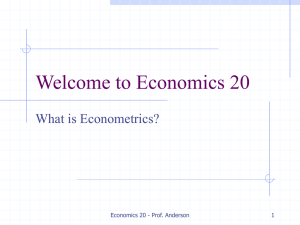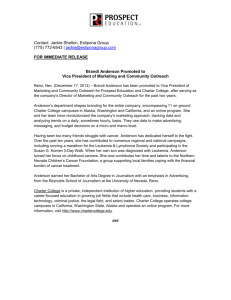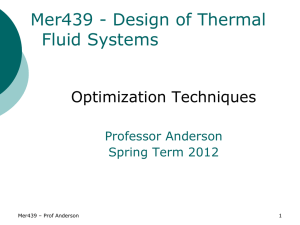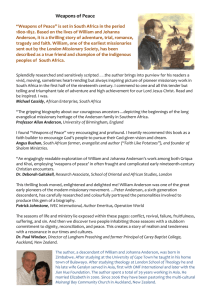Transcript - National Health and Medical Research Council
advertisement
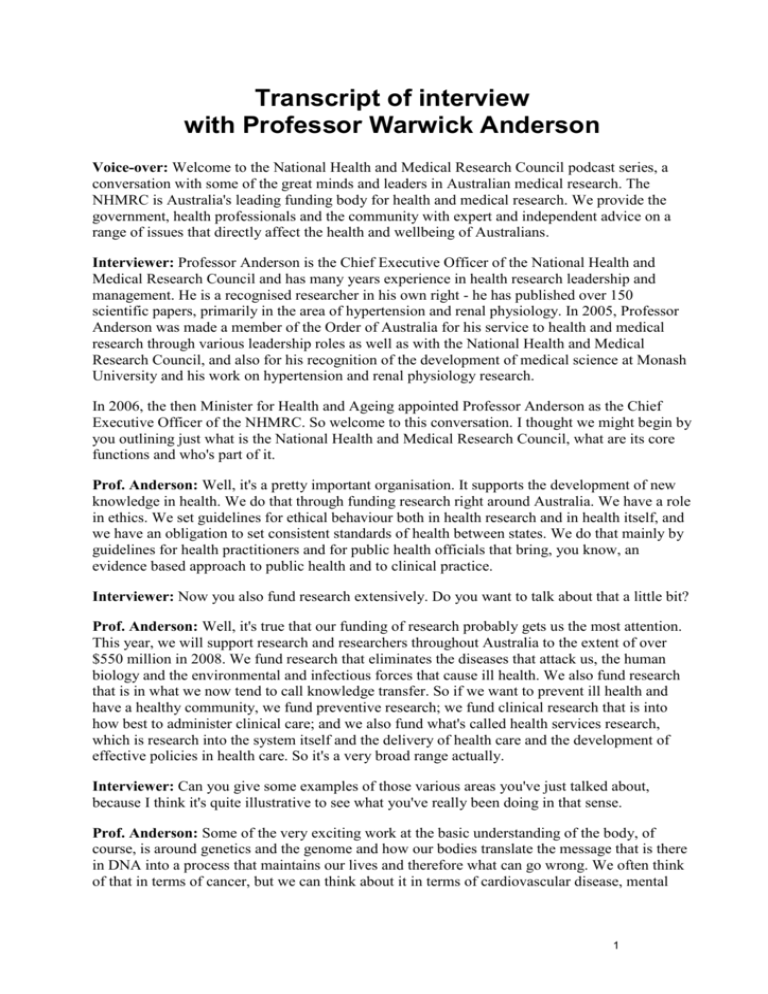
Transcript of interview with Professor Warwick Anderson Voice-over: Welcome to the National Health and Medical Research Council podcast series, a conversation with some of the great minds and leaders in Australian medical research. The NHMRC is Australia's leading funding body for health and medical research. We provide the government, health professionals and the community with expert and independent advice on a range of issues that directly affect the health and wellbeing of Australians. Interviewer: Professor Anderson is the Chief Executive Officer of the National Health and Medical Research Council and has many years experience in health research leadership and management. He is a recognised researcher in his own right - he has published over 150 scientific papers, primarily in the area of hypertension and renal physiology. In 2005, Professor Anderson was made a member of the Order of Australia for his service to health and medical research through various leadership roles as well as with the National Health and Medical Research Council, and also for his recognition of the development of medical science at Monash University and his work on hypertension and renal physiology research. In 2006, the then Minister for Health and Ageing appointed Professor Anderson as the Chief Executive Officer of the NHMRC. So welcome to this conversation. I thought we might begin by you outlining just what is the National Health and Medical Research Council, what are its core functions and who's part of it. Prof. Anderson: Well, it's a pretty important organisation. It supports the development of new knowledge in health. We do that through funding research right around Australia. We have a role in ethics. We set guidelines for ethical behaviour both in health research and in health itself, and we have an obligation to set consistent standards of health between states. We do that mainly by guidelines for health practitioners and for public health officials that bring, you know, an evidence based approach to public health and to clinical practice. Interviewer: Now you also fund research extensively. Do you want to talk about that a little bit? Prof. Anderson: Well, it's true that our funding of research probably gets us the most attention. This year, we will support research and researchers throughout Australia to the extent of over $550 million in 2008. We fund research that eliminates the diseases that attack us, the human biology and the environmental and infectious forces that cause ill health. We also fund research that is in what we now tend to call knowledge transfer. So if we want to prevent ill health and have a healthy community, we fund preventive research; we fund clinical research that is into how best to administer clinical care; and we also fund what's called health services research, which is research into the system itself and the delivery of health care and the development of effective policies in health care. So it's a very broad range actually. Interviewer: Can you give some examples of those various areas you've just talked about, because I think it's quite illustrative to see what you've really been doing in that sense. Prof. Anderson: Some of the very exciting work at the basic understanding of the body, of course, is around genetics and the genome and how our bodies translate the message that is there in DNA into a process that maintains our lives and therefore what can go wrong. We often think of that in terms of cancer, but we can think about it in terms of cardiovascular disease, mental 1 health and so on. So that translation of our DNA code through to us as living human beings operating in our society and, you know, there's a very large emphasis on that area. In public health, this is really the area where preventing of disease can be very important. You know, some of the great successes of Australian public health research would be road safety, where we've often led the world because our policies have been very strongly based on evidence and, of course, with very good political support of that to turn it into laws. I guess the whole campaign against smoking comes from evidence based public health research which lead to sensible decision making about what works and what doesn't. Interviewer: Now, of course, the battle against diabetes. Prof. Anderson: Well, there are two types of diabetes and they're both very interesting at the moment, but in different ways. So type 2 diabetes - the obesity that - the disease that comes from obesity - or I shouldn't say it comes from obesity, but the more obese we are the more likely we are to get type 2 diabetes. And we still don't understand what that connection is. So there's some need for some basic research. Interviewer: But you're putting out a very good public education program at the moment - or at least the Australian Government is - through making people aware that whilst we don't know the fundamental underlying causation of this, we know that if you're obese and if you eat the wrong foods, then the chance of you having type 2 onset is going to be significant. Prof. Anderson: Yes, it's very interesting for that reason. We know epidemiologically there's a correlation between obesity and type 2 diabetes. And so at this stage the clear focus lass to be on the message about that to try and convince people to think about it and look after it. What we don't know is what works in public policy, despite the messages we all still individually and the society are tending to get more obese. So there is a need for research to work out what's the effective way of intervening at a society level about that. But eventually in most diseases the real breakthroughs come when you understand the basic processes and low, until you know that, interventions can work, really effective treatments, really effective preventative mechanisms depend on understanding the basic mechanism. I just want to mention the other type of diabetes, type 1. This is the type that mainly affects young people, kids, teenagers and young adults. It's there, of course, where people hold out great hopes for stem cell science to actually repair the cells that are destroyed by a mysterious mechanism that destroys in, often in young people, although it can be older, destroys the cells which produce insulin, write of course we all need to control our blood sugar. There really is some very exciting work going around worldwide and here to see whether we can really replace those cells, which would be marvellous. Interviewer: And we've gone through various scenarios of replacing cells with eyelet transplantation, as they call it, from pigs and various other schemes. You've mentioned stem cells. What has been the role of the National Health and Medical Research Council in the stem cell debate and the policies that have emerged, because we've got some very exciting things, as you say, happening. Particularly last week - I believe they've announced that they now think they can derive stem cells from skin cells. So what's been the role? Prof. Anderson: Well, it's been several. We fund stem cell research, primarily adult stem cells, but some embryonic stem cell research, primarily in experimental models, mainly mice, but not exclusively. So we fund some research. The parliament of Australia has also given us the 2 responsibility of licensing the use of human embryos to derive stem cells and to licence the production of so-called therapeutic cloning and that is using women's ova to develop stem cell sources. We also regulate it through our guidelines. We have assisted reproductive technology guidelines which we issue from time to time and which are actually mentioned in the act, so we're heavily involved both from supporting the development of research, but also the ethical oversight of it. Interviewer: Do you guide the states on this as well, because they've got their own acts around a lot of this stuff? Prof. Anderson: Yes, well, what happened both in 2002 and recently is the states have tended to mirror the Commonwealth legislation here, so there's a consistent process across Australia. That means that the NHMRC with its licensing process for stem cells has jurisdiction over the country. Interviewer: Now, science is an international endeavour or a global endeavour, so how does the NHMRC work on a global collaborative basis with other organisations? Prof. Anderson: Yes, you've made a very important point. I often say that medical research research in general, but particularly medical research - was probably the first globalised activity. We think that around or close to 50 per cent of the people that we fund have international partners, other scientists involved in their research programs, which is fantastic. We have specific relationships with a number of organisations. With Canada and New Zealand we have a three-way funding scheme for the health of indigenous peoples in our three countries. We've worked with the NIH on peer review -Interviewer: And for those listeners who don't know what that is? Prof. Anderson: Well, that's the sort of big boy or gal in the international research funding scheme, the National Institute of Health, which funds US research. With the European Union, their Seventh Research Framework, we fund any Australian research that is supported through that mechanism. With the Juvenile Diabetes Research Foundation out of New York we fund co-fund - some type 1 diabetes research. And with the Wellcome Trust in the UK and our colleagues in New Zealand, again, we are funding some public health research programs in South-East Asia, and the Pacific, actually, for the big health problems that they face. I'd like to add, really, that recognising the intent of your question, really, about how important international links are, we're in the middle of an international review of our processes, involving the president of the Canadian institutes of health research, people from the NIH in the US, and from the UK through the national health system and from Singapore. We are doing that because we want to be as fully connected into the global health research programs and to make sure that everything we do from our means of selecting grants to our means of collaborating are as best it can be on an international scale. Interviewer: The NHMRC in Australia is an agency, I understand; is that correct? Prof. Anderson: Correct. Interviewer: Within the Department of health? Prof. Anderson: That's right. So we're an independent statutory agency but within the health portfolio, so I report directly to the Minister for Health. 3 Interviewer: How does that work in other countries? Are they similar sorts of arrangements, or are we unique in some way? Prof. Anderson: We're unique in one sense in that our broad scope, not just health research funding, but health advice, health ethics, licensing embryo research is unique. The system in the US is very similar to here, so for NIH, so that the NIH is directly responsible to the secretary, but within the Health and Human Services portfolio. In the UK it's split. Some research is split between Health and some through the MRC, which is more in a department of science, and there's just been a report there that is setting up an effective mechanism to bring those two things together. So it varies. Canada is quite like us too. Interviewer: Right. So you're charged with, I guess, evolving the National Health and Medical Research Council and aligning it with the government's objectives as well. Obviously you're trying to get better health outcomes for Australians. So what is your agenda for the next few years? What are the key priorities? Prof. Anderson: I think it's twofold really. It's to make sure that we fund absolutely top-class people and top-class ideas. Because there is no doubt - proven over and over again - that the big benefits for people's health come from top-class people and top-class research. But added to that, I'm really excited about the prospects there are of not just funding the research, but connecting it up to those who have the need for the research. And who are they? They're the people who make policy, governments around the country, health departments, people charged with specific responsibilities, such as the Australian Commission on Safety and Quality in Health Care and organisations like that. The community - we have a special emphasis on Indigenous health research and a very active program of talking to Indigenous people and communities about their priority. Industry - in health and medical research, there are fantastic prospects for new and exciting companies. Indeed, we have at least three big companies in that area in Australia Cochlear, that came out of the bionic ear research; ResMed, that came out of sleeping, apnoea research, and CSL, which is sort of going gangbusters and which has added Gardasil, which again came out of medical research, to its portfolio. So we're very active in promoting to our people - and the message seems to have got through in spades - that making benefit to the country in health, in people's individual health, in the way the system runs itself through clinical and health services research, but also making benefit to the country through the generation of new industries with exciting jobs, 21st century sort of jobs, is also one of the things that we can do for the place. Interviewer: One of the observations I've made from working in the science and technology commercialisation area over many years is that often some of the most interesting developments - maybe medical devices; you've mentioned a couple already - come from practising clinicians or surgeons and they seem to be a very inventive lot, and almost seem to invent things on the fly when they're working on a patient. Have you got any comment on that? Prof. Anderson: It's a very interesting comment. If you do work in providing people who are sick with care, if you're a surgeon or a physician, the motivation to do better is very high, you know. It's frustrating to be restricted to current technology for people who are in dire straits, so there is a very strong motivation there, there's no doubt about it. Over the last few years, we've been very keen to support more strongly people who do work in clinical care. We have a special fellowship for people who want to work in research, but also want to keep on working as surgeons, or physicians or physiotherapists and so on. It's called our practitioner fellowship scheme and we're delighted how successful it's been. We have also set up over 20 centres of clinical research excellence in hospital settings around the country - it's a unique scheme 4 internationally. It's a very flexible grant. It leaves clinical researchers a great deal of flexibility to use the money creatively at that exciting but very difficult interface really between research and generation of research and the patient's there in front of you. Interviewer: You've talked about research at the clinical level, but a translation of research at the commercial level, which you've touched on, do you think we're doing all right at that? Prof. Anderson: Look, I think we're doing a whole lot better perhaps than we think we are. Maybe it's an Australian characteristic to wring our hands about this. I think we've come a remarkable distance over the last eight or nine years, since the seminal report by Peter Wills in 1999. It really was very -Interviewer: It was called The Virtuous Cycle, wasn't it? Prof. Anderson: That's right. The concept is called the virtuous cycle, which in a nutshell is if governments invest in research, researchers produce knowledge that when taken up makes the country a better place. And the strong signal by the report, by the government's response, and by the NHMRC, was to researchers this is something we value. So we value it in our selection of grants examine people to support and we've just begun a very big analysis of the success of this and although the results are tentative, they're actually stunning, I think, and show that at least 19 per cent, maybe 20 per cent, of our funded research has been completed recently, developed something of specific commercial value from IPO listings through to licensing or royalties and so on, so a wide variety of things. Interviewer: Did you say 19 per cent? Prof. Anderson: 19 per cent. Interviewer: That's a very high success rate. Prof. Anderson: On the international scale, it's very high indeed, you're absolutely right. It reflects - well, first of all the ingenuity and drive of Australian medical researchers who, you know, are just on any measure world-class. I'll tell you one measure, actually. We've done an analysis of the papers that come out of NHMRC funded research and how well they're recognised by other researchers around the world - it's called citation indexes. We've looked at just the top 1 per cent internationally. So what are the hottest 1 per cent of papers internationally? You know, in there, Australian papers are at 2 per cent internationally. So in the top 1 per cent, we're double the world average, and the world average is mainly set by the US and a little bit by Europe. So we have a research community here that is absolutely second to none. Interviewer: Now, in your career you've been - well, you started off your career being a scientific researcher or medical researcher. I thought you might like to tell us your area of focus and some of the things you've done, because I think it's obviously been very important addressing a major health issue in our society. Prof. Anderson: Yes, well the thing that I've been mainly turned on by - I think it probably is the right expression - is hypertension. Hypertension is one of those forgotten things - it's high blood pressure, so you go along to your doctor, you might feel perfectly well, but he says you've got high blood pressure. And because you feel perfectly well, people tend to ignore it. For example, in Australia we know that treating it with non-specific drugs will lower our risk of having a heart attack or a stroke, but only about 50 per cent of the people take their pills and do it 5 effectively. Of course, there are much worse statistics for men than for women, as there usually are in these things. And around the world - depending on the way you look at it - high blood pressure is thought to be the second or the third or sometimes the most common cause of ill health. It's a surprising figure. We used to think - and maybe some people still think - it's a disease of stressed rich people, but that's not the case. It's not a respecter of socio-economic status. The surprising thing is we still really don't know what causes it. We have ways of treating it. You take pills that non-specifically affect all the control mechanisms for your blood pressure, how much your heart pumps and the resistance to the blood flowing through your body, but each one of these pills only lowers the blood pressure a little bit, so if you have very bad hypertension, you take a lot of pills, and you still suffer from hypertension and the risks associated with it. I've been interested for longer than I care to think on the role the kidneys play in this. That must seem a bit surprising. I mean, the kidneys are down there making urine, as we all know, what's that got to do with high blood pressure. Well, I won't take you through the physiology of it, but there are several mechanisms which we know are involved and there are a couple more that me and my research group think are not recognised yet as causes. Interviewer: I was taught in physiology that it was to do with making water loss - this was back in the 1970s. Prof. Anderson: I know - somebody once said to me, 'What's the least glamorous organ in the body, Warwick? - the kidney.' And I think a lot of people think that. But it controls the amount of water in our body. But one very important place where there's water in our body is our plasma, in our blood, so that's one direct effect on blood. The kidney makes a couple of really powerful hormones too, as it turns out, which are important in control of the blood, the water in the blood, but actually directly affect the blood vessels. There are some very interesting nerves that go to the kidney from our brain and then you can make the connection between the stresses and strains of normal life, which is true whether you're poor or rich, and how that affects blood pressure. But there are some other subtle things which we think the kidney controls and where hypertension, blood pressure, is a sort of unintended result from the body from it. We think it monitors the production of oxygen because the erythropoietin, EPO, which we all know about, is made in the kidney. The kidney actually takes, as we sit here, 20 per cent or 25 per cent of our total blood flow, so a tiny little organ, 1 per cent of our body weight, takes 20 per cent of our blood flow, protects itself against all the oxygen that arises there, and we think that that protection against being overloaded with oxygen, because oxygen is toxic to cells as well as being required for cells sets up a train that arises in blood pressure. As you can hear from all that, there are a lot of uncertainties and a long way to go, and one of the really interesting things about blood pressure research is that it requires all the modern research techniques, not just genetics and genomics, it requires imaging, it requires integrative systemic physiology and systems biology and all the new tools, the new ways of working that have emerged over the last 10 years. Interviewer: I would have thought that hypertension was driven probably by some sort of genetic issue. Have you got any comment on that? Because I'm very aware of quite young people who have developed hypertension and it seemed to run in families. So what's the evidence for this and where's that going? Prof. Anderson: I think it's like most complex diseases, that you have a genetic predisposition to high blood pressure, but whether you get high blood pressure or not depends on environmental factors. And that's true of many, many, perhaps the overwhelming majority of ill health that we face as human beings. There are some rare things, maybe some rare forms of breast cancer, for example, that are totally genetically determined, or Huntington's chorea. But most involve an interaction between genetic - complex genetic traits, which predispose you towards disease, and 6 then something in our social or physical environment. The best example of that for high blood pressure really is New Guinea people living a traditional lifestyle when moving down to the cities when they first had their blood pressure measured were all normotensive but within a few years after a proportion of them had high blood pressure. Of course salt, boring old salt, the stuff we put in our food, but more and more have in our food that's prepared for us is undoubtedly a culprit here. There's your link back to the kidney, because the kidney is responsible for getting rid of the salt. How that works, though, we really have just a glimmering of understanding. Interviewer: What inspired you to become a medical researcher? Prof. Anderson: I think two things. It was just very exciting as a science student at university to understand we didn't understand everything, you know. A big difference between high school and universities, where you suddenly realise that about the world around us and inside us, mostly we don't understand it. That was sort of exciting and, of course, that's what research is about. Also I had a father who died young from cardiovascular disease, so that's a pretty obvious link. And that's something you see a bit, actually, in medical researchers - there'll be a family link there, or somebody close to them that suffered from some cause of ill health that at least initially switched them on to their research area. Interviewer: One of the big things that we often worry about globally is getting enough young people interested in science and technology and medical research and trying to encourage them to take these courses and become practising scientists and even those that do become practising scientists tend to fade off into the distance as well sometimes. So what advice would you give to anyone who was listening to this who was either a parent or hopefully a younger person who was thinking about a career in this area? Prof. Anderson: Look, several things I'd say about that. Biological research, medical research, biomedical science, is actually an incredibly exciting stage and until recently I was head of the school of biomedical sciences at Monash University and I must say we had no trouble attracting people to biomedical science as undergraduate students and the same experience at the University of Melbourne, the University of Queensland, and many other universities that run this. You know, kids are smart. They get attracted to the areas that are hot and interesting and in the media and my view is that of course it's important to have students interested in maths and physics and chemistry and all those other totally crucial sciences. But students are going to be attracted to the areas of interest, and what we did at Monash was make sure they learned some physics and chemistry and so on, because they could see then why that was important as part of their biomedical science degree. So I don't think there's a magic formula. There is a need to promote the importance of maths and physics and the other sort of enabling science, but I think biology and biomedicine can be a trigger to increase the interest there. A career in science is not for everybody, you know. If you're interested in the unknown and working on that and working at your own direction - that's in the lab or sitting in front of your computer if you're an epidemiologist or whatever, self-motivation is very important. It is competitive. People do fall by the wayside, if you like, because what we, the NHMRC, and the Australian Research Council run are competitive rounds, so the best ideas and the best people continue to be supported. So in that sense it's not for the faint-hearted. But Australia needs more and more people working in the health system, in industry, in government, right across the country, who have had a research training, can do that translation of research from wherever it's formed into Australia, who've been trained in thinking and all those skills, project management, writing, all the skills that a research career teach you. And I think 7 what we need to do is to make sure there are these other pathways. Also that having two sort of generation Y children myself, people now want to mix and match. They want flexibility in their career. They want to be able to do some of this, then some of that, and then maybe come back to the first place and so on. This is a bit of a challenge for us at the NHMRC to make sure that our models of supporting people aren't kind of linear 1980s models, if I could put it that way, that you get on the ladder and then progress up, but allow people to do a PhD, some post docs, perhaps move into industry or health departments or into international investment companies if that's what they want, get experience there, come back to research. Interviewer: Warwick, thank you very much for your time today and very interesting comments, not only on the NHMRC, but your musings on where things are going. Prof. Anderson: Thank you very much. Voice-over: This podcast was brought to you by the NHMRC, working to build a healthier Australia. To find out more, go to our website at www.nhmrc.gov.au. 8

